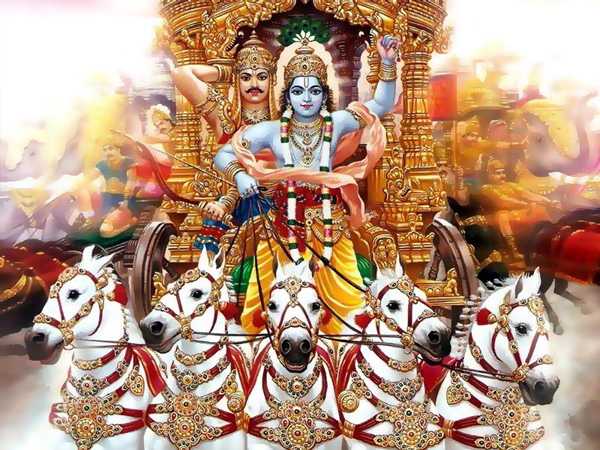Chapter 57

“Narada said, ‘Rama, the son of Dasaratha, O Srinjaya, we hear, fell aprey to death. His subjects were as much delighted with him, as a sire isdelighted with the children of his loins. Endued with immeasurableenergy, countless virtues were there in him. Of unfading glory, Rama, theelder brother of Lakshmana, at the command of his father, lived forfourteen years in the woods, with his wife. That bull among men slew inJanasthana fourteen thousand Rakshasas for the protection of theascetics. While dwelling there, the Rakshasa called Ravana, beguilingboth him and his companion (Lakshmana) abducted his wife, the princess ofVideha. Like the Three-eyed (Mahadeva), in days of old, slaying (theAsura) Andhaka, Rama in wrath slew in battle that offender of Pulastya’srace who had never before been vanquished by any foe. Indeed, themighty-armed Rama slew in battle that descendant of Pulastya’s race withall his kinsmen and followers, that Rakshasa who was incapable of beingslain by the gods and the Asuras together, that wretch who was a thornunto the gods and the Brahmanas. In consequence of his affectionatetreatment of his subjects, the celestials worshipped Rama. Filling theentire earth with his achievements, he was much applauded even by thecelestial Rishis. Compassionate unto all creatures, that king, havingacquired diverse realms and protected his subjects virtuously, performeda great sacrifice without obstruction. And the lord, Rama, also performeda hundred Horse-sacrifices and the great sacrifice called Jaruthya. Andwith libations of clarified butter he contributed to Indra’s delight.[96]And by these acts of his, Rama conquered hunger and thirst, and all thediseases to which living creatures are subject. Possessed of everyaccomplishment, he always blazed forth with his own energy. Indeed, Rama,the son of Dasaratha, greatly outshone all creatures. When Rama ruled hiskingdom, the Rishis, the gods, and men, all lived together on the earth.The lives of living creatures were never otherwise. The life-breathsalso, called Prana, Apana, Samana, and the others, when Rama ruled hiskingdom, all performed their functions. All luminous bodies shonebrighter, and calamities never occurred. All his subjects werelong-lived. None died in youth. The dwellers of heaven highly gratified,used to get, according to (the ordinances of) the four Vedas, libationsof clarified butter and other offerings of food made by men. His realmswere free from flies and gnats; and of beasts of prey and poisonousreptiles, there were none. And none was of unrighteous tendencies, nonewas covetous, and none was ignorant. The subjects, of all the (four)orders, were engaged in righteous and desirable acts, When the Rakshasas,about this time obstructed the offerings to the Pitris and the worship ofthe gods in Janasthana, Lord Rama, slaying them, caused those offeringsand that worship to be once more given to the Pitris and the gods. Menwere each blessed with a thousand children, and the period of their liveswas a thousand years. Seniors had never to perform Sraddhas of theirjuniors.[97] Youthful in shape, of a dark-blue hue, of red eyes,possessed of the tread of an infuriated elephant, with arms reaching downto the knees, and beautiful and massive, of leonine shoulders, of greatstrength, and beloved by all creatures, Rama ruled his kingdom for eleventhousand years. His subjects always uttered his name. While Rama ruledhis kingdom, the world became extremely beautiful. Taking at last hisfour kinds of subjects[98] with him Rama went to heaven, havingestablished his own line consisting of eight houses on the earth. Wheneven he died, O Srinjaya, who was superior to thee in respect of the fourcardinal virtues and superior to thy son, thou shouldst not lament,saying ‘Oh, Swaitya, Oh, Swaitya,’ for thy son who performed no sacrificeand made no sacrificial present.'”




